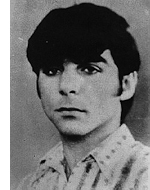Kishkush, Said
Son of Shaharban and Salman. Said, a member of the Druze community, was born on 20 May 1953 in the village of Shfaram. He attended elementary school in his hometown and was a friendly child and an outstanding student, diligent and disciplined. Said wanted to continue his studies, but the financial situation of the family did not allow this and he had to go out to work to help support the family. In his youth, Sayid was a member of the Druze Scouts club in his home, and over time became a guide in the club. He liked to listen to music, loved sports and was an active football player in the Druze Scouts group. He was recruited as a combat soldier in Judea and Samaria and northern Israel in 1973. In June 1973, while still in compulsory service, Sa’id married Hana, and a year later his eldest daughter was born. After his marriage, he continued to live in his parents’ house and began building his private home, which lasted for a long time, during which he was busy with his military service and building his home, but he always found time to sit with his family, which had grown over the years and had five children. Sayid continued to serve in the Border Guard and began serving as a combat driver in various units, including the water unit Sharp counter-terrorism. In time, he was promoted to assistant transport coordinator. In 1982 Sa’id asked to leave the Border Police and was transferred to serve in the Israel Police, and a few months later he wanted to return to the reactor of his Border Police headquarters. His friend, Yosef Shahin, relates: “Although his role in the field of transportation was always required to join the operational forces and to participate in the various events as a full-fledged fighter, in which he proved that he had been sent to serve in the Border Police unit in the north, He always has the courage and the confidence to carry out every mission in the best possible way. “He always liked to be with the operational forces on the ground and to engage in operational activity that is not necessarily related to his specific field of activity Sayid fell in the second Tire disaster While the IDF was operating against the PLO and Hizbullah in Lebanon, the Border Police acted in cooperation with the General Security Service (Shin Bet) to liquidate terrorist cells in the city of Tzur, where they were housed in a two-story building on Friday, November 4, 1983. At 06:00 a pickup truck drove from the Rosh Hanikra-Tzur road toward the facility, which was surrounded by a dirt embankment and a perimeter fence and was secured with constant guard. Despite the fire, the truck broke through the entrance gate to the facility and entered between the two buildings. The suicide bomber detonated the 500 kilograms of explosives in the car and caused the buildings to collapse. Sixty people were killed, including twenty-eight members of the security establishment. First sergeant Said fell in the line of duty. He was thirty years old when he fell. He was buried in the family plot at the cemetery in Shfaram. Survived by his wife, six children: Julia, Najah, Anayas, Salman, Mahan and Sayid, and parents. The eulogy delivered by his commander said: “It will take us a long time to get used to the fact that his place was absent from us, and he had the spirit of volunteering and helping his friends,
